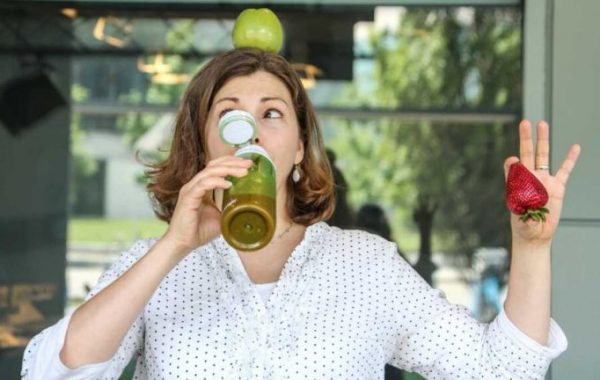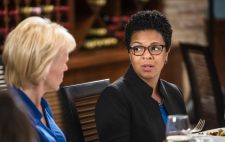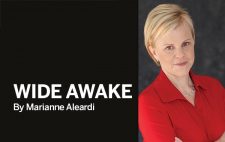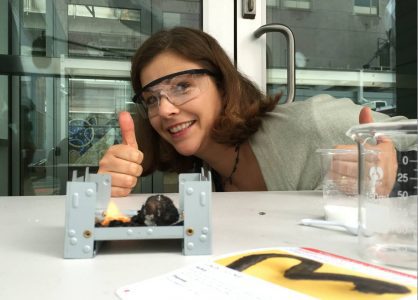
See Maiken Scott at our first Women’s Empowerment Panel on Sept. 9. For tickets, click here.
Maiken Scott’s WHYY radio show The Pulse can be terrifying at times. A recent episode detailed the enormous amounts of plastic trashing the oceans – and possibly contaminating the fish we eat. Other times, the topics are heartbreaking, like her story on new moms worried that treating their postpartum depression could mean losing their children. In the weekly series that focuses on health, science and innovation Scott explains complicated matters in plain English. On top of that, she has a knack for making you really care about the topic she’s discussing.
“I’m not a scientist by training,” she says, “but I’m curious.”
Fueled by that curiosity, Scott has developed some tricks to breathe life into interviews with some of the world’s foremost scientists and experts.
“When I’m interviewing people, I want to be sure I really understand things,” she says. “That often means asking lots of follow-up questions, asking for analogies and examples. Once I can understand something, I can explain it to somebody else.”
Scott grew up in southwestern Germany (she attended college in Philadelphia and never left), and in high school, she interned at a local radio station. That broadcast experience paved the way.
“Until then, I didn’t know what I wanted to study or if I wanted to go to school at all,” she says. “I really fell in love with radio. I’ve always been interested in issues about health and science — it’s fascinating.”
She developed her interview style fairly early in her career. One defining moment was a story about Heinrich Hertz, a physicist from her hometown who proved the existence of micromagnetic waves in the 19th century.
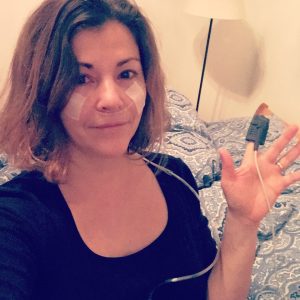 “I had a really, really tough time with this,” she recalls. “I felt very confused for quite some time, and eventually enlisted the help of a physicist to make sure I got the script right.”
“I had a really, really tough time with this,” she recalls. “I felt very confused for quite some time, and eventually enlisted the help of a physicist to make sure I got the script right.”
After initially covering behavioral health and producing Voices in the Family, with South Jersey psychologist Dan Gottlieb, hosting The Pulse was a natural extension.
Along with four reporters, Scott tackles a new topic each week. The show, airing Friday mornings at 9 am and also available as a podcast, examines science from several angles, giving listeners a comprehensive understanding of the topic at hand. While subjects like global warming and health concerns are alarming, these aren’t the topics that keep Scott up at night.
“The stories that weigh on me are more the personal stories where something terrible happened to somebody or when families face addiction and loss,” she says.
The variety of topics as well as the opportunities to learn from experts in those fields keeps her job, and the show, fresh and interesting.
“There’s an element of thrill and chase to finding somebody who is the perfect expert, but I don’t have a bucket list of people I want to interview,” she says.
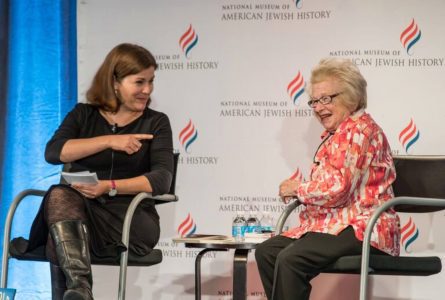
Photo by Matthew Christopher.
Scott enjoys tackling science as it relates to history, not surprising given that she received a master’s degree in history at Temple. A recent Pulse episode on the 50th anniversary of the moon landing is among her favorites.
“Just think,” she says, “people went to the moon 50 years ago with a limited capacity to compute things, but they figured it out.”
Another story that sticks with her was about identity and the detective work involved in tracing family histories with the help of DNA.
“I talked to a woman, Dani Shapiro, who found out at the age of 53, through some random DNA test, that she had been conceived at this fertility clinic that used donor sperm,” Scott says.
The donors were med students, who along with the children’s parents, were encouraged not to tell the children how they were conceived. Shapiro, who chronicled the story in her book “Inheritance,” tracked down her biological father, a retired doctor who had given sperm donations but never thought about it again.
Scott has, on occasion, recorded shows that never made it to air, because not every story is right for the radio.
“It can be a really interesting topic, but on the radio it can be incredibly dull,” she says. “Sometimes interviews don’t go as you wished. There are a lot of good experts or scientists who have a hard time explaining their work and keeping it simple so people can understand it.”
While breathing life into difficult topics is a strength, Scott recognizes that she has an especially educated and aware audience at WHYY, and they want to go along for the ride.
“When you’re working for a public radio audience, you’re always assuming that level of interest and engagement,” she says. “You’re writing for a very sophisticated audience.”
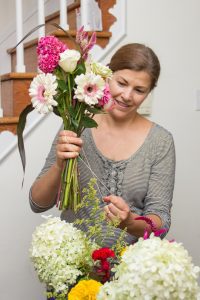 She says it’s her kids, Julius, 10, and Helene, 8, who keep her humble. While they share her interests in science and history, they aren’t always interested in her bringing it home.
She says it’s her kids, Julius, 10, and Helene, 8, who keep her humble. While they share her interests in science and history, they aren’t always interested in her bringing it home.
“We have, on occasion, listened to the show and my kids will say, ‘Can we turn this off? It’s nice to hear you, but it’s so boring,’” Scott says, laughing.
For her, making technical topics relevant is not the biggest challenge of our times. She’s concerned about how difficult it’s become nowadays for people with differing views to discuss politics and listen to views unlike their own. So she and her husband, Graham Gormley, who grew up in Elmer, are trying to change that on a small scale. They’ve hosted political discussion groups with neighbors in their home as a way to engage civilly in topics than can easily become heated – especially on social media.
“When you sit across from somebody you are much less likely to get irate or out of line,” she says. “You can attack the argument, but you can’t attack the person.”
As for social media, she’s trying to use it less.
“It can be very helpful in connecting you to other people,” she says. “For the show, I use Twitter a lot to research people, connect with them quickly and learn about things. I’ll use Facebook to ask a question about a specific show when I want people to weigh in. Like all tools, they can be great and they can be terrible. I try to harvest the good and stay away from the negative.”
Scott is especially frustrated that scientific facts that were accepted as truths have become polarized issues, especially climate change.
“Climate change became incredibly politicized in this country in a way that other science issues did not,” she says.
“There are other big environmental issues where you could enlist players on different sides of the aisle to say this affects us all. For example, watersheds or drinking water problems are issues where people are more willing to say, ‘We all suffer, so let’s try to figure this out.’ I wish we could go back in time and do that with climate change. The political nature has hurt the process.”
As difficult as it is to bring people together nowadays to address some of the major issues, Scott says she trusts that shining light on such topics will eventually lead to progress.
“I’m mostly an optimist, despite everything, and I think that even with the scary environmental stories, nature is very resilient and nature bounces back and finds a way to return to its state,” she says.


